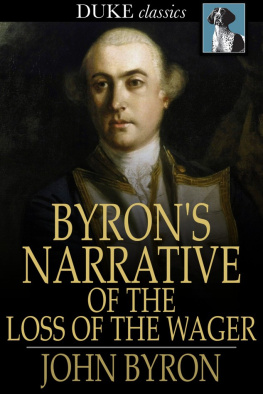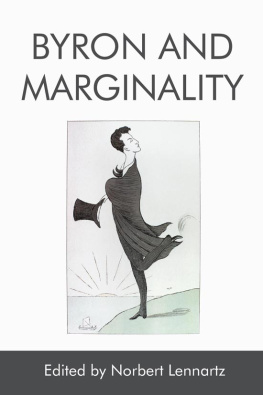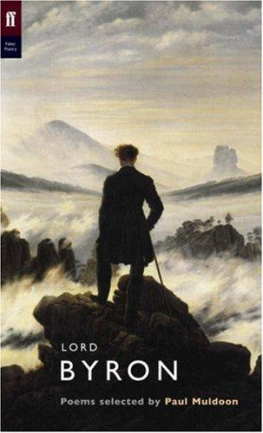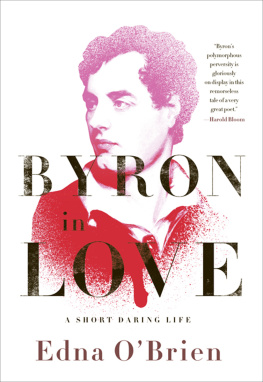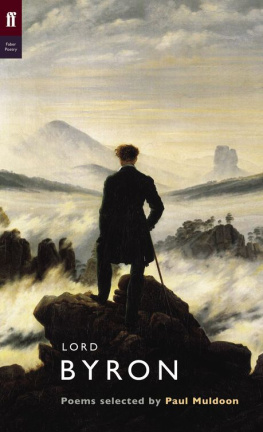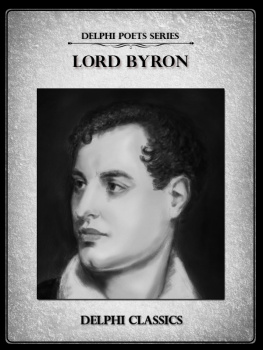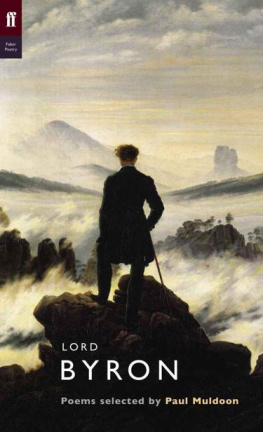Baron George Gordon Byron Byron - The Works of Lord Byron. Vol. 3
Here you can read online Baron George Gordon Byron Byron - The Works of Lord Byron. Vol. 3 full text of the book (entire story) in english for free. Download pdf and epub, get meaning, cover and reviews about this ebook. year: 1900, genre: Science. Description of the work, (preface) as well as reviews are available. Best literature library LitArk.com created for fans of good reading and offers a wide selection of genres:
Romance novel
Science fiction
Adventure
Detective
Science
History
Home and family
Prose
Art
Politics
Computer
Non-fiction
Religion
Business
Children
Humor
Choose a favorite category and find really read worthwhile books. Enjoy immersion in the world of imagination, feel the emotions of the characters or learn something new for yourself, make an fascinating discovery.

- Book:The Works of Lord Byron. Vol. 3
- Author:
- Genre:
- Year:1900
- Rating:3 / 5
- Favourites:Add to favourites
- Your mark:
- 60
- 1
- 2
- 3
- 4
- 5
The Works of Lord Byron. Vol. 3: summary, description and annotation
We offer to read an annotation, description, summary or preface (depends on what the author of the book "The Works of Lord Byron. Vol. 3" wrote himself). If you haven't found the necessary information about the book — write in the comments, we will try to find it.
The Works of Lord Byron. Vol. 3 — read online for free the complete book (whole text) full work
Below is the text of the book, divided by pages. System saving the place of the last page read, allows you to conveniently read the book "The Works of Lord Byron. Vol. 3" online for free, without having to search again every time where you left off. Put a bookmark, and you can go to the page where you finished reading at any time.
Font size:
Interval:
Bookmark:
Project Gutenberg's The Works Of Lord Byron, Vol. 3 (of 7), by Lord Byron
This eBook is for the use of anyone anywhere at no cost and with
almost no restrictions whatsoever. You may copy it, give it away or
re-use it under the terms of the Project Gutenberg License included
with this eBook or online at www.gutenberg.org
Title: The Works Of Lord Byron, Vol. 3 (of 7)
Author: Lord Byron
Editor: Ernest Hartley Coleridge
Release Date: June 12, 2007 [EBook #21811]
Language: English
*** START OF THIS PROJECT GUTENBERG EBOOK THE WORKS OF LORD BYRON ***
Produced by Jonathan Ingram, David Cortesi and the Online
Distributed Proofreading Team at http://www.pgdp.net
OF
LORD BYRON .
WITH ILLUSTRATIONS.
ERNEST HARTLEY COLERIDGE, M.A.,
HON. F.R.S.L.
JOHN MURRAY, ALBEMARLE STREET.
NEW YORK: CHARLES SCRIBNER'S SONS.
The source code for this HTML page contains only Latin-1 characters, but it directs the browser to display some special characters. The original work contained a few phrases or lines of Greek text. These are represented here as Greek letters, for example , .... If the mouse is held still over such phrases, a transliteration in Beta-code pops up. Aside from Greek letters, the only unusual characters are (a with macron), (i with macron), and (c with accent).
An important feature of this edition is its copious footnotes. Footnotes are indicated by small raised keys in brackets; these are links to the footnote's text. Footnotes indexed with arabic numbers (e.g. [17], [221]) are informational. Any text in square brackets is the work of editor E. H. Coleridge. Unbracketed note text is by Byron himself. Footnotes indexed with letters (e.g. [c], [bf]) document variant forms of the text from manuscripts and other sources.
In the original, footnotes were printed at the foot of the page on which they were referenced, and their indices started over on each page. In this etext, footnotes have been collected at the ends of each section, and have been numbered consecutively throughout.
Navigation aids are provided as follows. Page numbers are displayed at the right edge of the window. To jump directly to page nn, append #Page_nn to the document URL. To jump directly to the text of footnote xx, either search for [xx] or append #Footnote_xx to the document URL.
Within the blocks of footnotes, numbers in braces such as {321} represent the page number on which following notes originally appeared. These numbers are also preserved as HTML anchors of the form Note_321. To find notes originally printed on page nn, either search for the string {nn} or append #Note_nn to the document URL.

The present volume contains the six metrical tales which were composed within the years 1812 and 1815, the Hebrew Melodies, and the minor poems of 1809-1816. With the exception of the first fifteen poems (1809-1811)Chansons de Voyage, as they might be calledthe volume as a whole was produced on English soil. Beginning with the Giaour; which followed in the wake of Childe Harold and shared its triumph, and ending with the ill-omened Domestic Pieces, or Poems of the Separation, the poems which Byron wrote in his own country synchronize with his popularity as a poet by the acclaim and suffrages of his own countrymen. His greatest work, by which his lasting fame has been established, and by which his relative merits as a great poet will be judged in the future, was yet to come; but the work which made his name, which is stamped with his sign-manual, and which has come to be regarded as distinctively and characteristically Byronic, preceded maturity and achievement.
No poet of his own or other times, not Walter Scott, not Tennyson, not Mr. Kipling, was ever in his own lifetime so widely, so amazingly popular. Thousands of copies of the "Tales"of the Bride of Abydos, of the Corsair, of Larawere sold in a day, and edition followed edition month in and month out. Everywhere men talked about the "noble author"in the capitals of Europe, in literary circles in the United States, in the East Indies. He was "the glass of fashion ... the observ'd of all observers," the swayer of sentiment, the master and creator of popular emotion. No other English poet before or since has divided men's attention with generals and sea-captains and statesmen, has attracted and fascinated and overcome the world so entirely and potently as Lord Byron.
It was Childe Harold, the unfinished, immature Childe Harold, and the Turkish and other "Tales," which raised this sudden and deafening storm of applause when the century was young, and now, at its close (I refer, of course, to the Tales, not to Byron's poetry as a whole, which, in spite of the critics, has held and still holds its own), are ignored if not forgotten, passed over if not despisedwhich but few know thoroughly, and "very few" are found to admire or to love. Ubi lapsus, quid feci? might the questioning spirit of the author exclaim with regard to his "Harrys and Larrys, Pilgrims and Pirates," who once held the field, and now seem to have gone under in the struggle for poetical existence!
To what, then, may we attribute the passing away of interest and enthusiasm? To the caprice of fashion, to an insistence on a more faultless technique, to a nicer taste in ethical sentiment, to a preference for a subtler treatment of loftier themes? More certainly, and more particularly, I think, to the blurring of outline and the blotting out of detail due to lapse of time and the shifting of the intellectual standpoint.
However much the charm of novelty and the contagion of enthusiasm may have contributed to the success of the Turkish and other Tales, it is in the last degree improbable that our grandfathers and great-grandfathers were enamoured, not of a reality, but of an illusion born of ignorance or of vulgar bewilderment. They were carried away because they breathed the same atmosphere as the singer; and being undistracted by ethical, or grammatical, or metrical offences, they not only read these poems with avidity, but understood enough of what they read to be touched by their vitality, to realize their verisimilitude.
Tout comprendre c'est tout pardonner. Nay, more, the knowledge, the comprehension of essential greatness in art, in nature, or in man is not to know that there is aught to forgive. But that sufficing knowledge which the reader of average intelligence brings with him for the comprehension and appreciation of contemporary literature has to be bought at the price of close attention and patient study when the subject-matter of a poem and the modes and movements of the poet's consciousness are alike unfamiliar.
Criticism, however subtle, however suggestive, however luminous, will not bridge over the gap between the past and the present, will not supply the sufficing knowledge. It is delightful and interesting and, in a measure, instructive to know what great poets of his own time and of ours have thought of Byron, how he "strikes" them; but unless we are ourselves saturated with his thought and style, unless we learn to breathe his atmosphere by reading the books which he read, picturing to ourselves the scenes which he saw,unless we aspire to his ideals and suffer his limitations, we are in no way entitled to judge his poems, whether they be good or bad.
Font size:
Interval:
Bookmark:
Similar books «The Works of Lord Byron. Vol. 3»
Look at similar books to The Works of Lord Byron. Vol. 3. We have selected literature similar in name and meaning in the hope of providing readers with more options to find new, interesting, not yet read works.
Discussion, reviews of the book The Works of Lord Byron. Vol. 3 and just readers' own opinions. Leave your comments, write what you think about the work, its meaning or the main characters. Specify what exactly you liked and what you didn't like, and why you think so.

